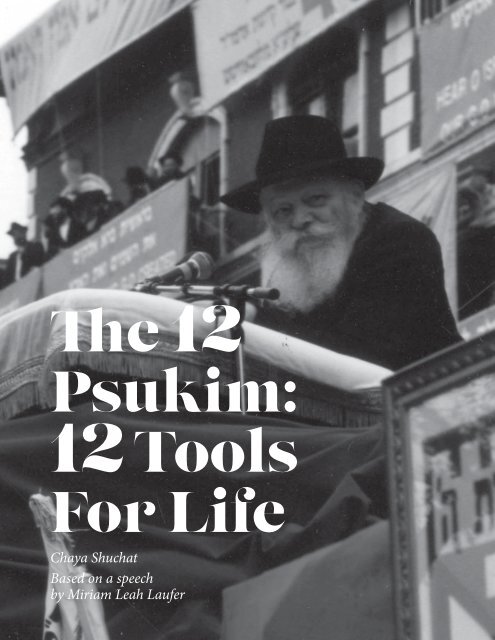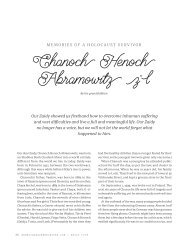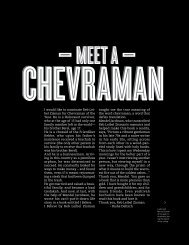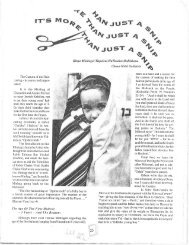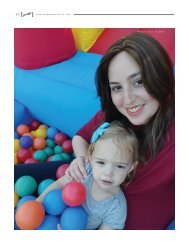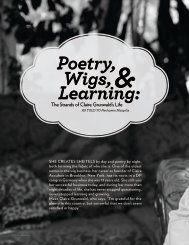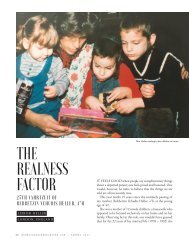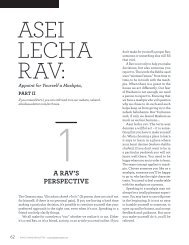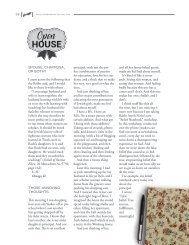The 12 Psukim: !12 Tools for Life
- No tags were found...
You also want an ePaper? Increase the reach of your titles
YUMPU automatically turns print PDFs into web optimized ePapers that Google loves.
<strong>The</strong> <strong>12</strong><br />
<strong>Psukim</strong>:<br />
<strong>12</strong> <strong>Tools</strong><br />
For <strong>Life</strong><br />
Chaya Shuchat<br />
Based on a speech<br />
by Miriam Leah Laufer
83
84 NSHEICHABADNEWSLETTER.COM<br />
1<br />
Torah Tzivah:<br />
Identity<br />
<strong>The</strong> Torah that Moshe commanded<br />
us is the heritage of<br />
the congregation of Yaakov.<br />
(Devarim 33:4)<br />
All the children pictured in this article are Tzivos Hashem soldiers at the Mega Hakhel event<br />
in Crown Heights, Sukkos 2015.<br />
Mazel Tov! Your baby is born, completely helpless and dependent on you <strong>for</strong> every need. It is<br />
now your job to raise this child into a healthy, independent adult with strong chassidishe values.<br />
Quite an awesome undertaking and many of us feel woefully unequipped.<br />
On Rosh Chodesh Iyar 5736 (1976), the Rebbe introduced six psukim and taught how they are<br />
fundamental to the chinuch of every Jewish child. <strong>The</strong> first two are from Tanach, the next two<br />
are maamarei Chazal, and the next two are from Tanya. During the Lag B’omer parade that<br />
same year, the Rebbe introduced another set of six, following the same pattern: two from Torah<br />
sheb’chsav, two from Torah sheb’al peh, and two from the Alter Rebbe’s teachings. <strong>The</strong> order<br />
of the psukim was not random but carefully structured by the Rebbe. In the above two sichos<br />
the Rebbe explains how these psukim are essential tools in the development of a Jewish child.<br />
<strong>The</strong> Rebbe urges us to teach these psukim to our children and repeat them at every opportunity.<br />
Each passuk is a guidepost, showing us the way through each stage of a child’s development.<br />
<strong>The</strong> first developmental task<br />
of a child, from the moment it<br />
is born, is to develop a sense<br />
of its own identity. A baby<br />
lives within its mother <strong>for</strong><br />
nine months, and <strong>for</strong> the first<br />
few months after birth it still<br />
sees itself as an extension of<br />
its mother. Gradually it learns<br />
that there is an outside world,<br />
separate from itself. A child’s<br />
experiences during infancy<br />
set the stage <strong>for</strong> its emotional<br />
development <strong>for</strong> life.<br />
<strong>The</strong> Rebbe emphasized<br />
that from the moment a child<br />
is born, we surround the child<br />
with psukim of Torah. <strong>The</strong> first<br />
passuk that we teach a child, the<br />
one we sing to a baby when it<br />
first awakens to the world, is<br />
Torah tzivah. Why this one?<br />
Why not Bereishis—the first<br />
passuk in Torah?<br />
<strong>The</strong> expression used in this<br />
passuk is morashah—inheritance.<br />
<strong>The</strong>re are three ways<br />
of acquiring something—we<br />
can buy it, receive it as a gift,<br />
or inherit it. When we buy<br />
something we are limited by<br />
how much money we have.<br />
A gift, too, has certain limits,<br />
since what we receive depends<br />
on our relationship with the<br />
giver. You give a bigger gift to<br />
someone you’re close to than
FEBRUARY 2016<br />
85<br />
to a casual acquaintance. You<br />
also would not give the same<br />
gift to a five-year-old child as<br />
to an adult. But with inheritance,<br />
there are no limits.<br />
You do not have to do anything<br />
to earn it, and the size<br />
or value of the inheritance is<br />
not in proportion to the person<br />
receiving it. <strong>The</strong> first life lesson<br />
we teach our children is that<br />
the Torah is a morashah—it is<br />
our inheritance and cannot be<br />
taken away. <strong>The</strong> Torah is what<br />
defines us—this is our identity.<br />
2<br />
Shema:<br />
Security<br />
Hear O Israel, Hashem is our<br />
G-d, Hashem is One. (Devarim<br />
6:4)<br />
At age one or two, children<br />
enter the exploratory phase.<br />
<strong>The</strong>y learn to walk and climb<br />
and do many other things<br />
independently. <strong>The</strong>y want to<br />
look and touch and taste and<br />
feel everything. As their world<br />
expands, children begin to<br />
realize that the world can actually<br />
be a scary place. Children<br />
need to have a secure base, a<br />
secure attachment to their<br />
parents, to feel safe enough to<br />
explore the world.<br />
<strong>The</strong> second passuk, Shema,<br />
instills in children the awareness<br />
that no matter where they<br />
go, Hashem is with them. <strong>The</strong><br />
Shulchan Aruch states that<br />
when we say the word echad,<br />
we should have in mind that<br />
Hashem is one (alef) in the<br />
seven heavens plus earth<br />
(eight, the gematria of ches),<br />
and in all four directions<br />
(gematria of daled). This gives<br />
a child a tremendous sense of<br />
safety and security. I can leave<br />
the nest and learn to be independent—because<br />
Hashem is<br />
always with me.<br />
3<br />
Bechol:<br />
Initiative<br />
In every generation a person<br />
must look upon himself as if he<br />
personally had gone out of Egypt.<br />
(Pesachim 116b)<br />
During the pre-school years,<br />
ages three to five, children<br />
develop many new skills. <strong>The</strong>y<br />
learn to color, to use scissors<br />
and glue, to build things out<br />
of Legos and blocks. <strong>The</strong>y are<br />
not just moving <strong>for</strong> the sake<br />
of movement—they have a<br />
goal in mind and are learning<br />
to plan the steps needed<br />
to accomplish a task. At this<br />
age children love to be little<br />
helpers, bringing food to the<br />
table or putting toys away. But<br />
sometimes a child may not be<br />
able to achieve the goal exactly<br />
as planned and then gets frustrated,<br />
acting out by kicking,<br />
hitting or throwing objects.<br />
At this age, the child has<br />
<strong>for</strong>med a strong sense of identity<br />
(Torah) and feels safe and<br />
secure (Shema). At this point<br />
we can begin to teach the<br />
child: You have a responsibility<br />
in this world. We all have<br />
our personal Mitzrayim, our<br />
limitations that keep us from<br />
doing what we need to do. We<br />
have a yetzer hara that we must<br />
overcome. But just as the Yidden<br />
went out of Mitzrayim we<br />
have the power to go out of our<br />
own Mitzrayim. That is our job<br />
and our mission—the obligation<br />
of every one of us.<br />
4<br />
Kol Yisroel:<br />
Community<br />
All Israel have a share in<br />
the World to Come, as it is stated:<br />
“And Your people are tzadikim.”<br />
<strong>The</strong>y shall inherit the land <strong>for</strong>ever.<br />
<strong>The</strong>y are the branch of<br />
My planting, the work of My<br />
hands, in which I take pride.<br />
(Sanhedrin 90a)<br />
During the toddler years<br />
children tend to play next to<br />
each other but not with each<br />
other—known as parallel play.<br />
Slowly, children learn to incorporate<br />
others into their play.<br />
<strong>The</strong>y develop the sense of<br />
being part of a group, and then<br />
face the challenge of figuring<br />
out exactly how they fit into<br />
that group. At this point their<br />
identity is still fluid—they<br />
may see themselves in terms<br />
of their position in the family<br />
or their standing in class. <strong>The</strong>y<br />
learn the intricacies of group<br />
dynamics—how you have to<br />
act to be part of a group, who<br />
is in the “in-group” and who<br />
is on the outside. During this<br />
stage children have to develop<br />
a strong sense of themselves<br />
while also learning to get along<br />
with others.<br />
<strong>The</strong> passuk of Kol Yisroel has<br />
within it these dual lessons<br />
on being an individual while<br />
being part of a community.<br />
<strong>The</strong> word kol refers to each of<br />
us as an individual, while Yisroel<br />
emphasizes how we are<br />
part of a klal. Each of us is a<br />
unique creation of Hashem,<br />
netzer mato’ai maasei yodai,<br />
in whom He takes pride. We<br />
teach our children that there<br />
is a place reserved <strong>for</strong> them<br />
in Olam Haba which they can<br />
earn through their own ef<strong>for</strong>ts.<br />
We are each given our own<br />
role and task to fulfill that will<br />
lead to the reward. This gives<br />
our children the cheshek they<br />
need to learn Torah and fulfill<br />
mitzvos with joy, knowing that<br />
they can make a difference. Yet<br />
we are connected to all other<br />
Jews. We are part of Klal Yisroel<br />
and all of us are tzadikim,<br />
each in our own way. <strong>The</strong> passuk<br />
of Kol Yisroel instills in<br />
children the confidence they<br />
need to be strong individuals,<br />
among other strong individuals<br />
who share a common goal<br />
and purpose.<br />
5<br />
Ki Karov:<br />
Competence<br />
It is within your close reach to follow<br />
the Torah in speech, feeling<br />
and deed. (Devarim 30:14)<br />
Children ages six to <strong>12</strong> move<br />
beyond simple activities like<br />
coloring and pasting to master<br />
many complex skills. <strong>The</strong>y<br />
can read a passuk and explain<br />
it to others. <strong>The</strong>y are learning<br />
to express their own thoughts<br />
through speech and writing.<br />
<strong>The</strong>y may practice a game or<br />
a musical instrument until<br />
they become very good at it.<br />
<strong>The</strong>y are starting to discover<br />
that they have individual talents<br />
that set them apart from<br />
their peers. At this stage children<br />
can also develop feelings<br />
of inferiority, if they are unable<br />
to earn the respect and admiration<br />
of their teachers and<br />
parents through demonstrating<br />
their skills.<br />
<strong>The</strong> message of Ki karov<br />
is that each of us has a mission<br />
to fulfill in this world and
86 NSHEICHABADNEWSLETTER.COM<br />
Children<br />
have a direct<br />
perception<br />
of Hashem<br />
that doesn’t<br />
require a lot of<br />
elaboration.<br />
Hashem gives us the capabilities<br />
we need to achieve it. We<br />
have control over our own<br />
speech (b’ficha), thoughts (bilvavcha)<br />
and actions (la’asoso).<br />
Everything else is not in our<br />
hands. We are responsible <strong>for</strong><br />
developing our individual talents,<br />
but if someone else has<br />
a talent that we don’t have,<br />
this means that this talent is<br />
not necessary <strong>for</strong> our avodas<br />
Hashem. We need to concentrate<br />
on our own work without<br />
comparing ourselves to others.<br />
6<br />
V’hinei:<br />
Perception<br />
Behold, Hashem is standing over<br />
him, and fills the whole earth with<br />
His glory, and He searches his<br />
mind and heart [to see] if he is<br />
serving Him as is fitting. (Tanya,<br />
Chapter 41)<br />
Young children are very concrete<br />
thinkers. As they grow<br />
older they mature in their<br />
capacity <strong>for</strong> abstract thought—<br />
to reason, to think about<br />
hypothetical situations, to plan<br />
future events and to understand<br />
the consequences of<br />
actions. This capacity does not<br />
become fully developed until<br />
the early 20’s.<br />
A child’s understanding of<br />
Hashem is simple and uncomplicated.<br />
Children have a<br />
direct perception of Hashem<br />
that doesn’t require a lot of<br />
elaboration. END<br />
In the maamar Shoresh Mitzvas<br />
Hatefillah, the Tzemach<br />
Tzedek quotes, “Ani mispalel<br />
ledaas zeh hatinok.” I daven with<br />
the knowledge of a child. This<br />
maamar contains very complex<br />
ideas from Kabbalah and<br />
Chassidus to meditate on during<br />
davening, so why does the<br />
Tzemach Tzedek talk about<br />
the knowledge of a child? <strong>The</strong><br />
Rebbe explains (Sefer Maamarim<br />
Melukatim, Emor 5737) that<br />
no matter how vast and deep<br />
our understanding of Hashem<br />
may be, our davening must be<br />
permeated with the simplicity<br />
of a child—the knowledge<br />
that we are children speaking<br />
to our Father.<br />
Children have an innate<br />
awareness of Hashem. Our<br />
task as parents is not to instill<br />
this awareness but to make<br />
sure that it doesn’t get covered<br />
up as they become more<br />
immersed in the velt. As they<br />
get older they are exposed to<br />
more in<strong>for</strong>mation and begin<br />
to grasp the vastness of the<br />
universe—the earth is just<br />
one planet out of millions of<br />
stars and galaxies. I am just<br />
one person out of billions!<br />
<strong>The</strong> age-old question arises—<br />
does Hashem, Who is so great<br />
and fills the entire universe,<br />
really care about me? Is what<br />
I do important to Him? <strong>The</strong><br />
passuk of V’hinei instills in a<br />
child not only a sense of awe<br />
at Hashem’s greatness, but<br />
that we are important to Him<br />
and He watches what we do;<br />
He cares.<br />
7<br />
Bereishis:<br />
Creativity<br />
In the beginning Hashem created<br />
the heavens and the earth. (Bereishis<br />
1:1)<br />
During adolescence, teens<br />
develop greater powers of<br />
self-expression. <strong>The</strong>y learn to<br />
plan projects, to build displays,<br />
to write stories and essays, to<br />
per<strong>for</strong>m on stage. <strong>The</strong>y gradually<br />
assume more leadership<br />
roles in the community—leading<br />
Shabbos groups, going on<br />
mivtza’im, babysitting, working<br />
as counselors, giving<br />
shiurim. All these ef<strong>for</strong>ts put<br />
their creativity to the test as<br />
they prepare to enter the adult<br />
world.<br />
Children who are shy or<br />
lack confidence may feel swallowed<br />
up during this stage, as if<br />
their voices are not heard and<br />
they don’t matter. <strong>The</strong>y may<br />
be overlooked when it comes<br />
to summer jobs or school<br />
activities. <strong>The</strong>y may not know<br />
how to express their ideas in<br />
a way that will make others<br />
pay attention. <strong>The</strong>y see their<br />
peers flourishing, creating and<br />
achieving wonderful things,<br />
while they feel worthless and<br />
powerless.<br />
And here is where the passuk<br />
of Bereishis comes in. All powers<br />
of creativity derive from<br />
Hashem. When we are successful<br />
we must remember this<br />
and thank Him humbly. When<br />
we are not, we can always turn
FEBRUARY 2016<br />
87<br />
to Hashem and ask Him <strong>for</strong><br />
help to open up, to find our<br />
own voice, our own niche, the<br />
way in which we can contribute<br />
something to this world.<br />
Hashem is the Baal Habayis of<br />
this world Who invested each<br />
of us with some of His creative<br />
powers. We need not be intimidated<br />
by others.<br />
8<br />
V’shinantam:<br />
Diligence<br />
And you shall teach the Torah to<br />
your children, and you shall<br />
speak about it when you are home<br />
and when you travel, be<strong>for</strong>e you<br />
lie down to sleep and when you<br />
wake up. (Devarim 6:7)<br />
When we teach our children<br />
the psukim in a way that<br />
is mindful of their developmental<br />
stage, taking their<br />
personality and emotions<br />
into account, children become<br />
enthusiastic learners and want<br />
to learn more and more. <strong>The</strong>y<br />
will come to us begging, “Teach<br />
me today’s Chitas! Tell me the<br />
Hayom Yom!” Our challenge as<br />
parents is not to “make” our<br />
children learn but to quench<br />
their thirst in a natural way.<br />
When the Rebbe Rashab<br />
was four or five years old, he<br />
came to his grandfather, the<br />
Tzemach Tzedek, in tears. He<br />
had learned that Hashem had<br />
appeared to Avraham and he<br />
was crying because Hashem<br />
did not appear to him. <strong>The</strong><br />
Rebbe explains in a sichah<br />
(Likutei Sichos Chelek 20, Vayera)<br />
that this story was not told<br />
just to teach us how special the<br />
Rebbe Rashab was. Every Jewish<br />
child has the potential to<br />
desire Hashem to the point of<br />
tears. It is our job as parents<br />
and teachers to stimulate that<br />
excitement in our children.<br />
Throughout the day there<br />
are teaching moments—sitting<br />
around the supper table,<br />
while walking down the street,<br />
when you put the children to<br />
bed and when they wake up.<br />
<strong>The</strong> weekly parshah, stories<br />
of tzadikim, chassidishe vertlach—children<br />
eat them up and<br />
readily absorb them. We have<br />
a wealth of material available<br />
to us in many different <strong>for</strong>mats—books,<br />
CD’s, videos,<br />
charts, games—to make learning<br />
exciting and accessible <strong>for</strong><br />
our children.<br />
9<br />
Yagati:<br />
Perseverance<br />
If someone says, “I have worked<br />
hard, and I have not been successful,”<br />
don’t believe him. If someone<br />
says, “I have not worked hard and<br />
I have been successful,” don’t<br />
believe him. If someone says, “I<br />
have worked hard, and I have<br />
been successful,” believe him!<br />
(Megilla, 6b)<br />
We’ve been through eight steps<br />
so far and at this point you may<br />
be saying, this is all too much!<br />
Can we really be expected to be<br />
teaching Torah to our children<br />
every second, in between cooking<br />
meals, washing laundry,<br />
driving carpool, not to mention<br />
pregnancy and nursing<br />
babies! I don’t have the time, I<br />
don’t have the patience, I don’t<br />
have the knowledge.<br />
Raising children takes<br />
ef<strong>for</strong>t. If someone says, “I<br />
put no special work into my<br />
children and they turned out<br />
fine,” don’t believe them.<br />
But if someone says, “I tried<br />
and I did not succeed,” don’t<br />
believe them either. <strong>The</strong> passuk<br />
of Yagati teaches us that no<br />
ef<strong>for</strong>t is in vain. Whatever you<br />
put into your children will pay<br />
off in the long run. <strong>The</strong> Rebbe<br />
Rashab tells us to spend a half<br />
hour a day thinking about the<br />
chinuch of our children. If<br />
that’s too much, can you start<br />
with 15 minutes? Five minutes?<br />
Take small steps each day to<br />
invest a little more time and<br />
ef<strong>for</strong>t into your children and<br />
you will see the dividends.<br />
<strong>The</strong> word matzasi does<br />
not mean “I succeeded” or “I<br />
achieved.” It means “I found.”<br />
That means that the reward is<br />
not according to our ef<strong>for</strong>ts—<br />
it is much greater than our<br />
ef<strong>for</strong>ts. It’s like paying one<br />
dollar <strong>for</strong> a lottery ticket and<br />
winning a million. You didn’t<br />
work <strong>for</strong> that million dollars,<br />
it came to you. But it would<br />
not have come if you did not<br />
put that dollar in. So put a dollar<br />
into your child, put in five<br />
minutes, ten minutes, whatever<br />
you can. Every Yid has<br />
the power to figure out what<br />
Hashem wants from them and<br />
to bring it into actuality.<br />
10<br />
V’ahavta:<br />
Love<br />
Rabbi Akiva says that to “Love<br />
your fellow as yourself” is a<br />
great basic principle of the Torah.<br />
(Vayikra 19:18, Midrash)<br />
Young children are naturally<br />
self-centered. As they grow<br />
we teach them the skills they<br />
need to be sociable human<br />
beings: to share, cooperate,<br />
take turns, have manners. But<br />
at what point do we learn to<br />
truly bond with other people,<br />
to be as invested in their success<br />
as we are in our own, to<br />
transcend our own needs and<br />
desires <strong>for</strong> the sake of others?<br />
Some people, un<strong>for</strong>tunately,<br />
never learn this<br />
important life skill. <strong>The</strong>y may<br />
learn the trappings of civilized<br />
behavior but at heart they are<br />
completely egotistical, thinking<br />
only of how to advance<br />
themselves.<br />
<strong>The</strong> essence of Torah is<br />
to grow to become a person<br />
without ego—or rather, to see<br />
others as an extension of our<br />
own ego. As Perek 32 of Tanya<br />
explains, “As long as we make<br />
the body primary and the soul<br />
secondary, it is impossible to<br />
have true love and friendship<br />
between them…” When we<br />
place less emphasis on materialism<br />
and more on matters of<br />
the soul, it comes naturally to<br />
us to feel our essential unity.<br />
Although our bodies are separate,<br />
we are one soul.<br />
Having progressed through<br />
the psukim, the next developmental<br />
step is to think beyond<br />
yourself. How can I inspire<br />
others as I have been inspired?<br />
How can I teach these psukim<br />
to someone else in a way that<br />
will be meaningful to them, in<br />
a way that speaks to their mind<br />
and neshamah?<br />
11<br />
V’zeh:<br />
Purpose<br />
And this is all of man and the<br />
purpose of his creation, and the<br />
creation of all the worlds, higher<br />
and lower: To be [make] a dwelling<br />
place <strong>for</strong> G-d in this lowly<br />
world. (Tanya, Chapter 33)
88 NSHEICHABADNEWSLETTER.COM<br />
<strong>The</strong> children we raised are<br />
now adults—working, married,<br />
raising their own families.<br />
As we go through adult life we<br />
face many challenges. Sometimes<br />
our trials are in worldly<br />
areas: parnassah, health, childrearing.<br />
Sometimes they may<br />
be in the spiritual realm, confronting<br />
our own doubts and<br />
crises of faith as well as the<br />
questions and challenges of<br />
others. At a certain age people<br />
may have a mid-life crisis,<br />
wondering, Why am I here?<br />
What is the purpose of it all? Have<br />
I achieved anything noteworthy<br />
in my life? Without a clearly<br />
defined goal, we go through<br />
life in a haze, never quite able<br />
to lift ourselves up above our<br />
surroundings.<br />
Chassidus is unique in that<br />
it teaches us how to achieve<br />
balance between our physical<br />
and spiritual lives, between<br />
body and soul. It teaches us<br />
that our purpose in life is not to<br />
achieve material success, nor is<br />
it to soar in the heavens while<br />
leaving physical cares behind.<br />
Our mission here is to merge<br />
heaven and earth—to combine<br />
the two into a place that has all<br />
the advantages of both heaven<br />
and earth. We are here to create<br />
something unique, something<br />
that all the angels cannot do,<br />
something that nobody but us,<br />
as souls in bodies, can accomplish.<br />
We are here in this world<br />
to make a dirah b’tachtonim, a<br />
dwelling <strong>for</strong> Hashem in the<br />
lowest world. And this gives<br />
us the strength to rise above<br />
our circumstances and all the<br />
difficulties we face in life. We<br />
know that davka through facing<br />
this hardship and meeting<br />
this challenge, we are elevating<br />
this part of the world. Every<br />
single thing we do has meaning<br />
and purpose. It is all part<br />
of the Divine plan to help us<br />
reach the ultimate goal, the<br />
dirah b’tachtonim.<br />
<strong>12</strong><br />
Yismach: Joy<br />
<strong>The</strong> Jews should rejoice in their<br />
Maker. Every Jew should share<br />
in G-d’s joy, Who rejoices and is<br />
happy in His dwelling place in<br />
this world. (Tanya, Chapter 33)<br />
I recently saw a feature in a<br />
parenting magazine on how to<br />
make the most out of your trip<br />
to Disney World. <strong>The</strong> “expert”<br />
advice was to start planning<br />
your trip a year in advance!<br />
Only then can you make sure<br />
to get the best deal on hotels<br />
and reserve the shows and<br />
rides of your choice. Because<br />
who wants to go to Disney<br />
World and squander even one<br />
second of potential fun?<br />
From a secular, western<br />
perspective, true joy is very difficult<br />
to achieve. We live in a<br />
future-oriented society, where<br />
we are always planning and<br />
saving <strong>for</strong> some future event,<br />
or trying to avert some future<br />
calamity. From an early age we<br />
are taught to start saving <strong>for</strong><br />
retirement. So we go through<br />
our lives focusing on some<br />
theoretical age when we will<br />
reap the benefits of all that we<br />
worked <strong>for</strong> all our lives. Except<br />
that moment never comes.<br />
When people reach retirement<br />
age, even those with com<strong>for</strong>table<br />
savings, they suddenly<br />
find themselves bereft and<br />
alone, and start to wonder—<br />
is this what I saved up <strong>for</strong> all<br />
my life?<br />
From the point of view of<br />
Chassidus, joy isn’t something<br />
you plan <strong>for</strong> or save up <strong>for</strong>. It<br />
doesn’t come from parties or<br />
vacations or new furniture.<br />
Joy arises naturally as a result<br />
of living as a Jew, secure in the<br />
knowledge that we are serving<br />
Hashem and are partners<br />
with Him in this very special<br />
project, to make the world into<br />
a home <strong>for</strong> Hashem. And our<br />
joy is a shared joy. <strong>The</strong> ultimate<br />
stage of development <strong>for</strong> a<br />
chossid is to share in Hashem’s<br />
joy, to do mitzvos only <strong>for</strong> His<br />
sake. <strong>The</strong>n we will feel the exuberance<br />
that Hashem has when<br />
He sees His creation come to<br />
life, to recognize Him and<br />
invite him into the world that<br />
He created. Hashem’s simchah<br />
becomes our simchah, and this<br />
leads us to the ultimate simchah<br />
and the greatest one of<br />
all—the coming of Moshiach.<br />
Chaya Shuchat is the author of<br />
the wildly popular A Diamond<br />
a Day, an adaptation of Hayom<br />
Yom <strong>for</strong> children. Volume 2,<br />
covering the months of Sivan to<br />
Kislev, has just been released and<br />
is available in Jewish bookstores<br />
or online at diamondpublications.org.
FEBRUARY 2016<br />
<strong>The</strong> <strong>12</strong> <strong>Psukim</strong><br />
89<br />
1 תורה צוה לנו משה מורשה קהילת יעקב<br />
שמע ישראל הוי’ אלקינו הוי’ אחד<br />
בכל דור ודור חייב אדם לראות את עצמו כאילו הוא יצא ממצרים<br />
4<br />
3<br />
5<br />
כל ישראל יש להם חלק לעולם הבא שנאמר ועמך כולם<br />
צדיקים לעולם ירשו ארץ נצר מטעי מעשי ידי להתפאר<br />
כי קרוב אליך הדבר מאד בפיך ובלבבך לעשותו<br />
2<br />
והנה ה’ נצב עליו ומלא כל הארץ כבודו ומביט<br />
עליו ובוחן כליות ולב עם עבדו כראוי<br />
בראשית ברא אלקים את השמים ואת הארץ<br />
ושננתם לבניך ודברת בם בשבתך בביתך ובלכתך בדרך ובשכבך ובקומך<br />
9<br />
8<br />
6<br />
יגעתי ולא מצאתי אל תאמין. לא יגעתי<br />
ומצאתי אל תאמין. יגעתי ומצאתי תאמין<br />
7<br />
10<br />
ואבהת לרעך כמוך רבי עקיבא אומר זה כלל גדול בתורה<br />
וזה כל האדם ותכלית בריאתו ובריאת כל העולמות עליונים<br />
11 ותחתונים להיות לו יתברך דירה זו בתחתונים<br />
ישמח ישראל בעושיו פירוש שכל מי שהוא מזרע ישראל יש לו לשמח<br />
<strong>12</strong> .בשמחת הוי’ אשר שש ושמח בדירתו בתחתונים


